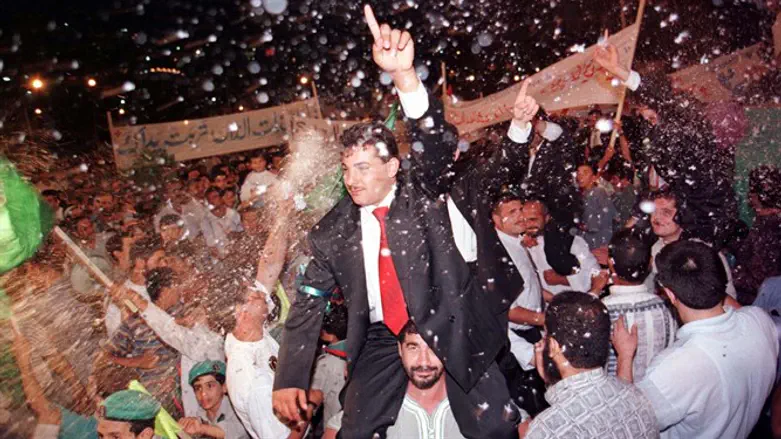
Residents of the Jewish neighborhoods in eastern Jerusalem such as Ma'ale Hazeitim and Kfar Shiloah, as well as residents of the border neighborhoods such as Pisgat Ze'ev and French Hill, have been reporting fire and shooting near their homes since Thursday morning.
The fire has become part of PA matriculation exam graduation ceremony culture - the Tawjiha exams - held in high schools in Judea and Samaria and eastern Jerusalem.
The festivities, which are often violent in nature and include drag racing, fireworks, and what the IDF has termed "gunfire of joy" from rifles, are also detected in some Judea/Samaria Jewish communities near Muslim towns and villages.
The phenomenon began in 1998, when Haaretz's Amos Harel reported that “Palestinian security forces have recently accelerated and intensified their military training,” as Judea and Samaria's Jews expressed apprehension at what they saw as concrete signs that their security was being increasingly endangered.
On August 28, 1998, Arutz Sheva "spoke to Yehuda Danah, security officer for Beit El. Asked whether he was satisfied that the level of security for the Yesha communities is adequate, he admitted that he does not have a good feeling about the situation.
“'The Palestinians have a new practice of shooting guns and firecrackers during their weddings, which are very common during this time of year. Their goal is to accustom us to hearing these sounds, which will have its psychological effect in case of attack, when we will not react promptly. We used to rush our emergency units out whenever shooting was heard, but we can’t do that anymore.' Danah said that he has had many meetings with army officers in the area on the matter, but he has not seen much progress. He admitted that the army was not likely to actively stop all shootings of this nature, even though they occur in areas that are under Israeli security control. He said that the army has other ways to pressure the Arabs to stop this practice, which it has apparently not implemented."
Later, on November 3, 1999, Arutz Sheva reported residents of Judea and Samaria continued complaining of noisy and frequent fireworks, weapon fire, and explosions near their communities. Binyamin Region security chief Avigdor Shatz echoed the army's official line about weddings causing the gunfire, but told Arutz Sheva that "some of the noises are indeed weapon practice by Arabs. What is especially worrisome, though, is that it has become so commonplace that when someone hears actual weapons fire, he may ignore it, passing it off as another wedding celebration." Concerns were expressed by residents that the phenomenon may signal danger for the Israeli towns if a violent conflagration erupts in the future.
Celebrations continue to be repeated each year at the conclusion of the Tawja exams, and include shooting that in the past has caused casualties among celebrants.
The Palestinian Authority has even feigned combating the phenomenon, predictably without success, and in eastern Jerusalem, celebrations taking place this morning may endanger the lives of Arabs and Jews.
Residents of the Jewish neighborhoods in the eastern part of the city reported to Arutz Sheva this morning about shooting near the houses and the balconies, and about their great fear of possible damage to houses and danger on the roads.